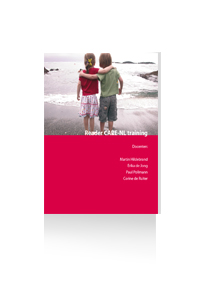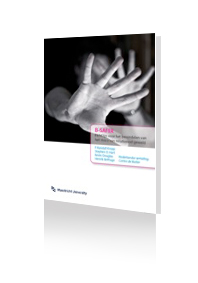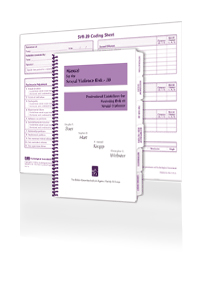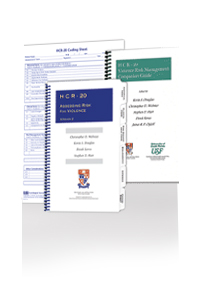Workshops
Violence risk assessment is a key task of many professional groups who evaluate offenders and others. Dr. Hildebrand provides state-of-the-art training in a range of violence risk assessment tools. For example, he provides training in assessing risk for child abuse (CARE-NL), spousal violence (B-SAFER/SARA), general violence (e.g., HCR-20), and sexual violence (e.g., SVR-20). He also trains professionals in the use of the Psychopathy Checklist-Revised (PCL-R) and the Psychopathy Checklist: Youth Version (PCL: YV). Dr. Hildebrand is not only an experienced trainer, but also very familiar with the application and implementation of risk assessment to various real life settings, including forensic psychiatric hospitals, Child Protective Services, Dutch Probation Service etc. For more information, see ‘Contact’To give a general impression of the trainings provided by Dr. Hildebrand, some of the workshops are described in more detail.
Risk assessment and management of child abuse: The Child Abuse Risk Evaluation – NL (CARE-NL)
The impact of child maltreatment on individuals, families, and society is well established. The effects on the child may include intellectual and physical handicaps, impaired impulse control, poor self-esteem, affective problems, developmental problems, and problems in interpersonal relationships. The CARE-NL (de Ruiter & de Jong, 2005) is a general risk assessment guideline for child abuse and neglect that is useful for a variety of professionals including psychologists, correctional workers, social workers, and so forth. These professionals are involved in a number of activities that would benefit from a general risk assessment instrument. For example, social workers consider risk for child abuse and neglect when they make decisions such as whether a child should be removed from his or her home. Psychologists make recommendations concerning custody and access that should include an assessment of risk for child abuse and neglect. Corrections staff may need to consider risk for child abuse and neglect when making a number of decisions, such as whether an offender should be denied pre-trial release because he poses an imminent risk to his or her children. All of these professionals would be well served by general risk assessment guidelines for child abuse and neglect.
In this workshop, the content and the administration of the CARE-NL will be reviewed. Case examples will be presented to allow those attending to apply the CARE-NL in their own work with confidence.
Risk assessment and management of spousal violence: The B-SAFER and SARA
Spousal violence is a uniquely common and dangerous form of violence. This workshop will prepare participants to administer two structured professional judgment (SPJ) instruments, both translated into Dutch, designed for use with spousal assaulters, the Brief Spousal Assault Form for the Evaluation of Risk (B-SAFER), a screening measure designed for use in situations where limited time is available for risk assessment, and the Spousal Assault Risk Assessment Guide (SARA), a well validated and comprehensive tool designed to assist practitioners in case management.
This workshop reviews the content and the administration of the instruments. Case studies will be presented to allow those attending to apply the instruments in their own work with confidence. It is expected that the workshop will appeal to those working for the Dutch Probation Services, in in mental health, law enforcement, and corrections settings, as well as to those who work specifically with victims of spousal violence.
Risk assessment and management of (sexual) violence: The HCR-20 and SVR-20
Systematic assessment of the risk of harm to others is now generally accepted to be a crucial component in the effective management of violent offenders. Using the method of structured professional judgment, violence risk assessment is geared towards the design of a comprehensive risk management plan. With growing recognition of the need for multidisciplinary involvement in risk assessment and risk management planning, as well as an increased awareness of its relevance in any setting where people with histories of violence are encountered, an increasing number of professionals are being expected to contribute to the process.
The HCR-20 is a tool for assessing general violence risk and is perhaps the most commonly applied risk assessment tool using the SPJ approach. It provides guidelines for integrating information from a broad range of risk factors associated with violence recidivism. The Sexual Violence Risk – 20 (SVR-20) is a tool for assessing sexual violence risk that was described in two recent meta-analyses as having the strongest association with sexual recidivism when compared to other risk assessment measures. It provides guidelines for integrating information from a broad range of risk factors associated with sexual violence recidivism.
This workshop is aimed at any professional working with (sexual) violent offenders or academics with an interest in violence risk assessment and management. Participants will learn about the structured professional judgment approach and about the background and procedures to the HCR-20 and the SVR-20. This workshop will review the content and the administration of both the HCR-20 and SVR-20. Using case examples, participants will practice drawing up future risk scenarios risk and devising risk management strategies.
Assessment of Psychopathic Personality Disorder (PCL-R)
Psychopathic personality disorder is an important risk factor for violence. Additionally, it has relevance for treatment and risk management. The Psychopathy Checklist Revised (PCL-R) is currently the best validated measure of psychopathy. The use of the PCL-R has become widespread across many agencies; it provides a standard methodology for assessing this important risk factor. In particular, emphasis is given to the clinical information derived from the instrument and how that information can be used in risk violence formulation. Using a variety of teaching modalities didactic, interactive and practical exercises, this workshop will introduce participants to the PCL-R. Video cases of forensic psychiatric patients will be used to allow participants to apply the PCL-R ratings and obtain feedback. The strengths and limitations of the PCL-R will be discussed.




